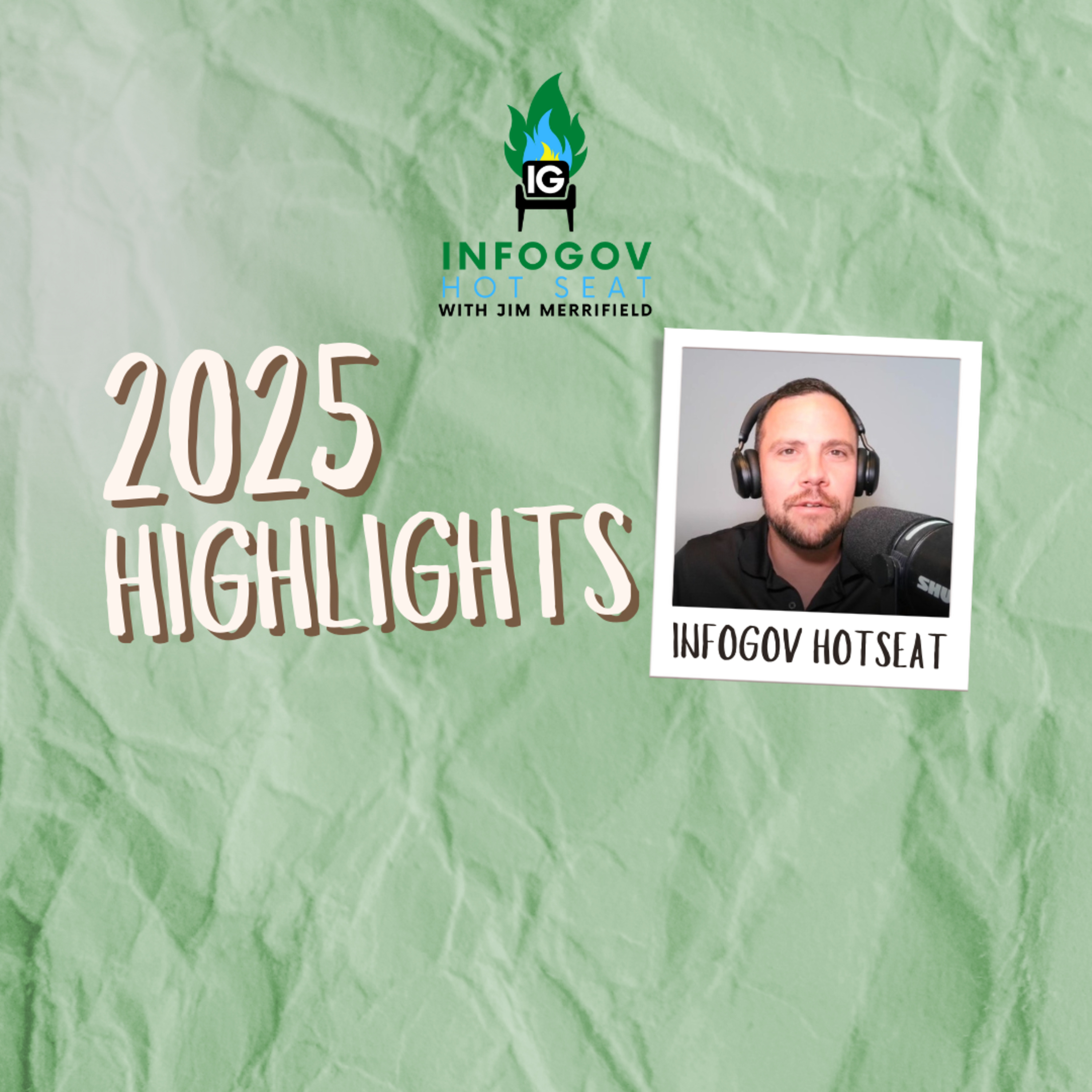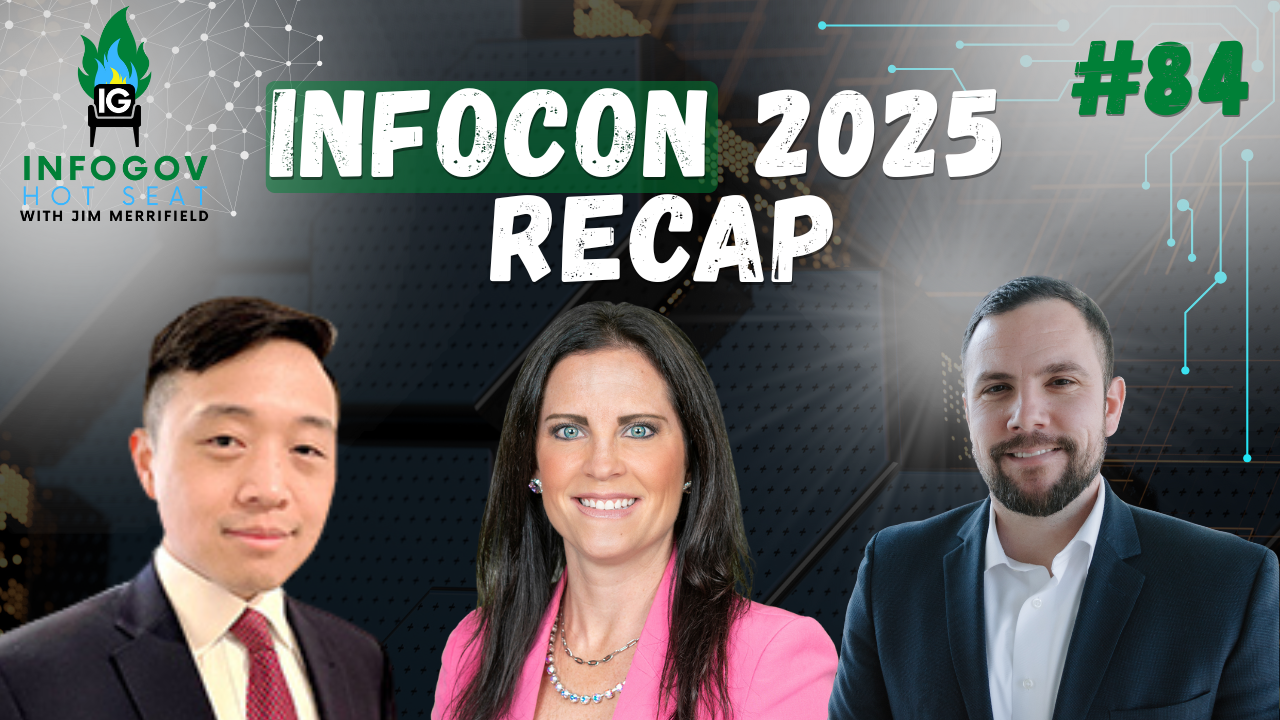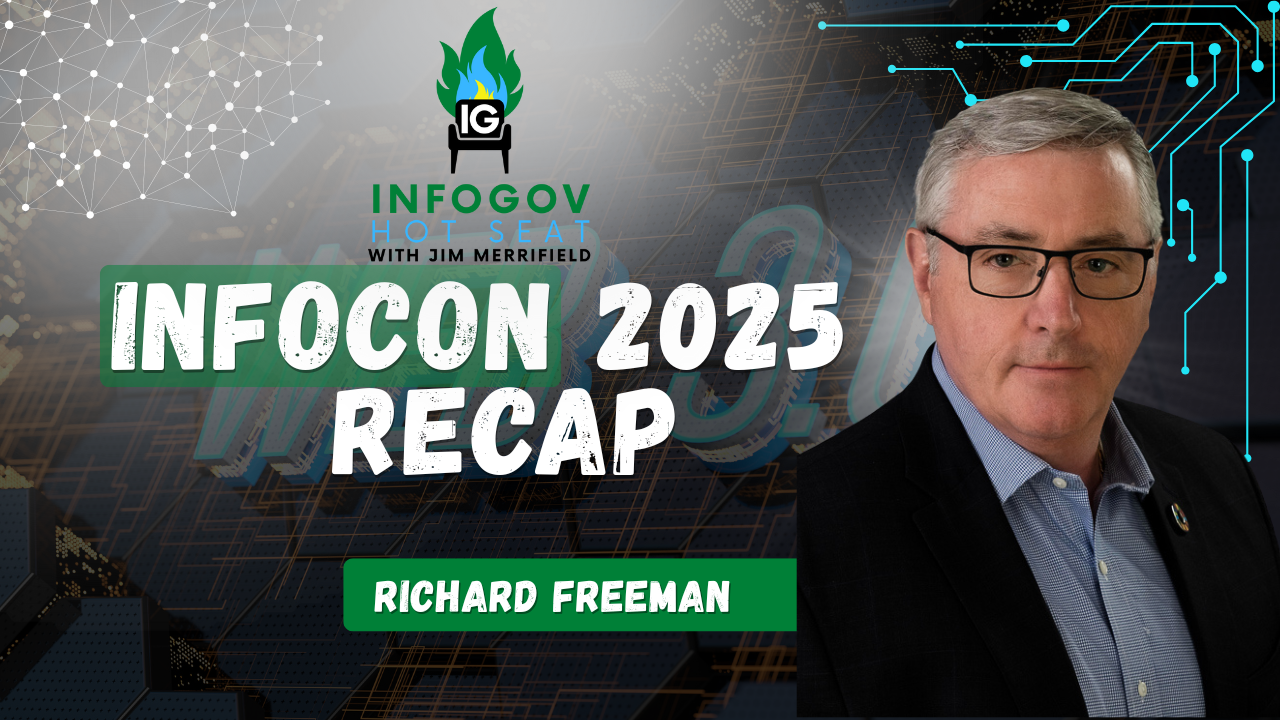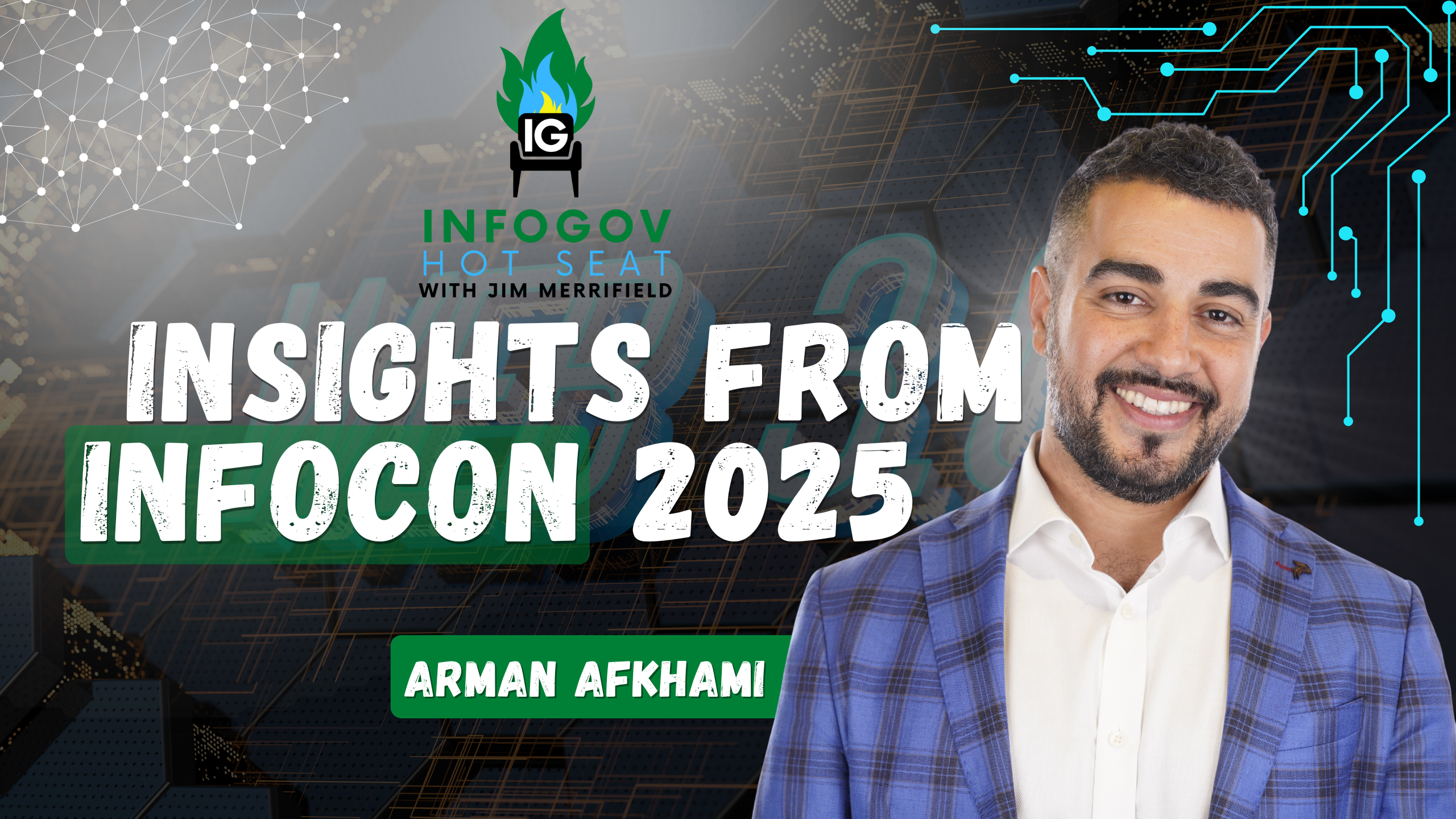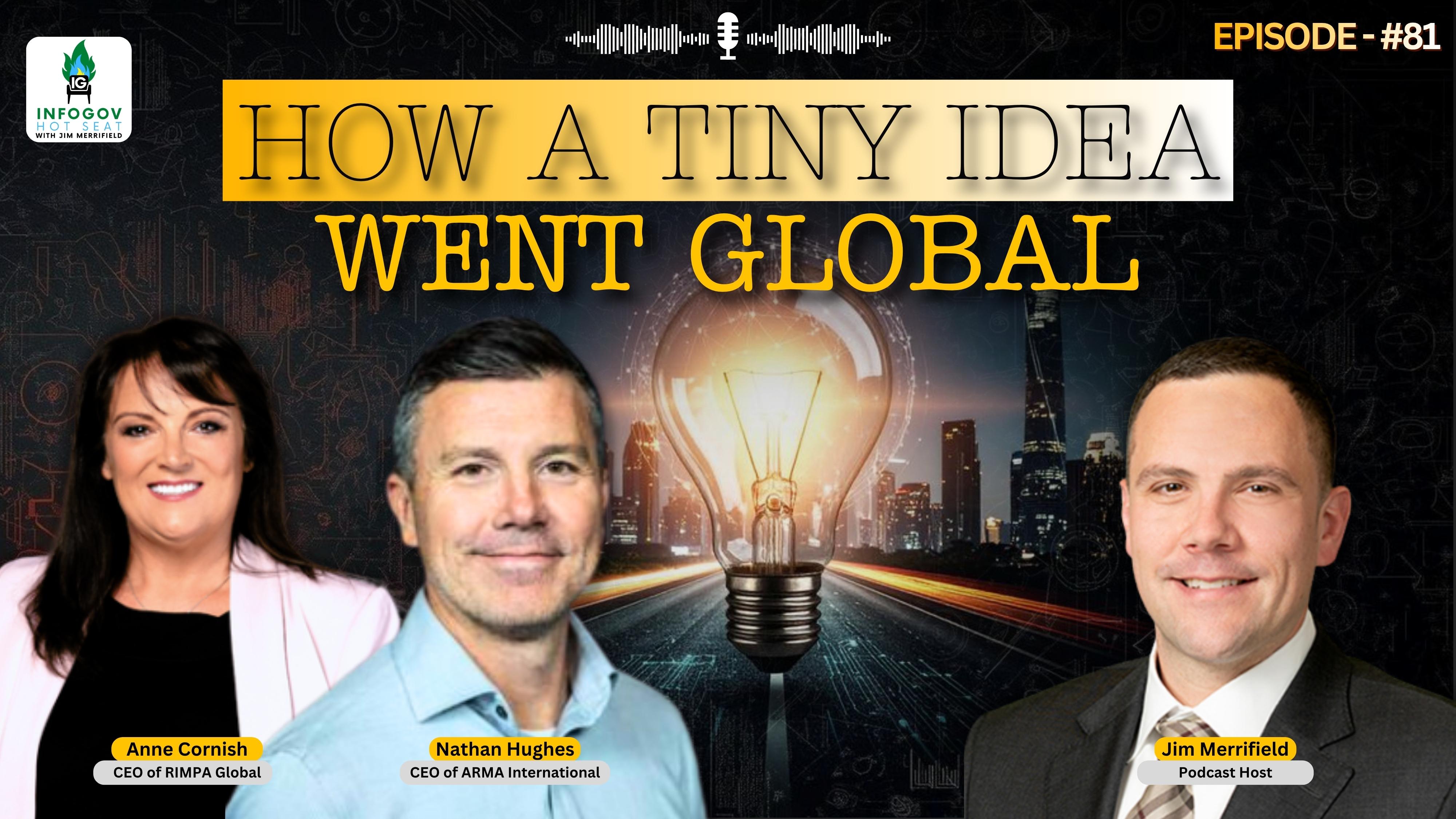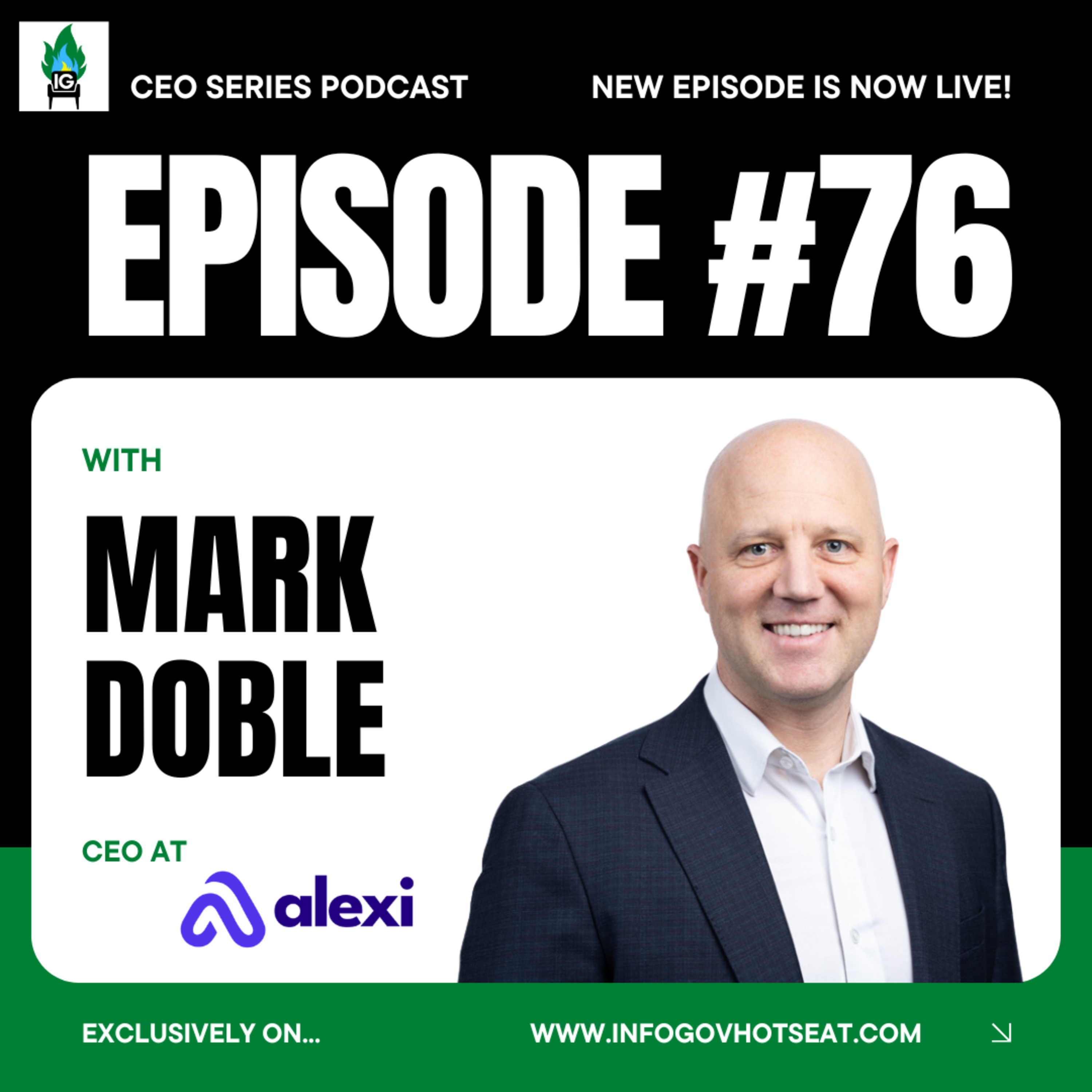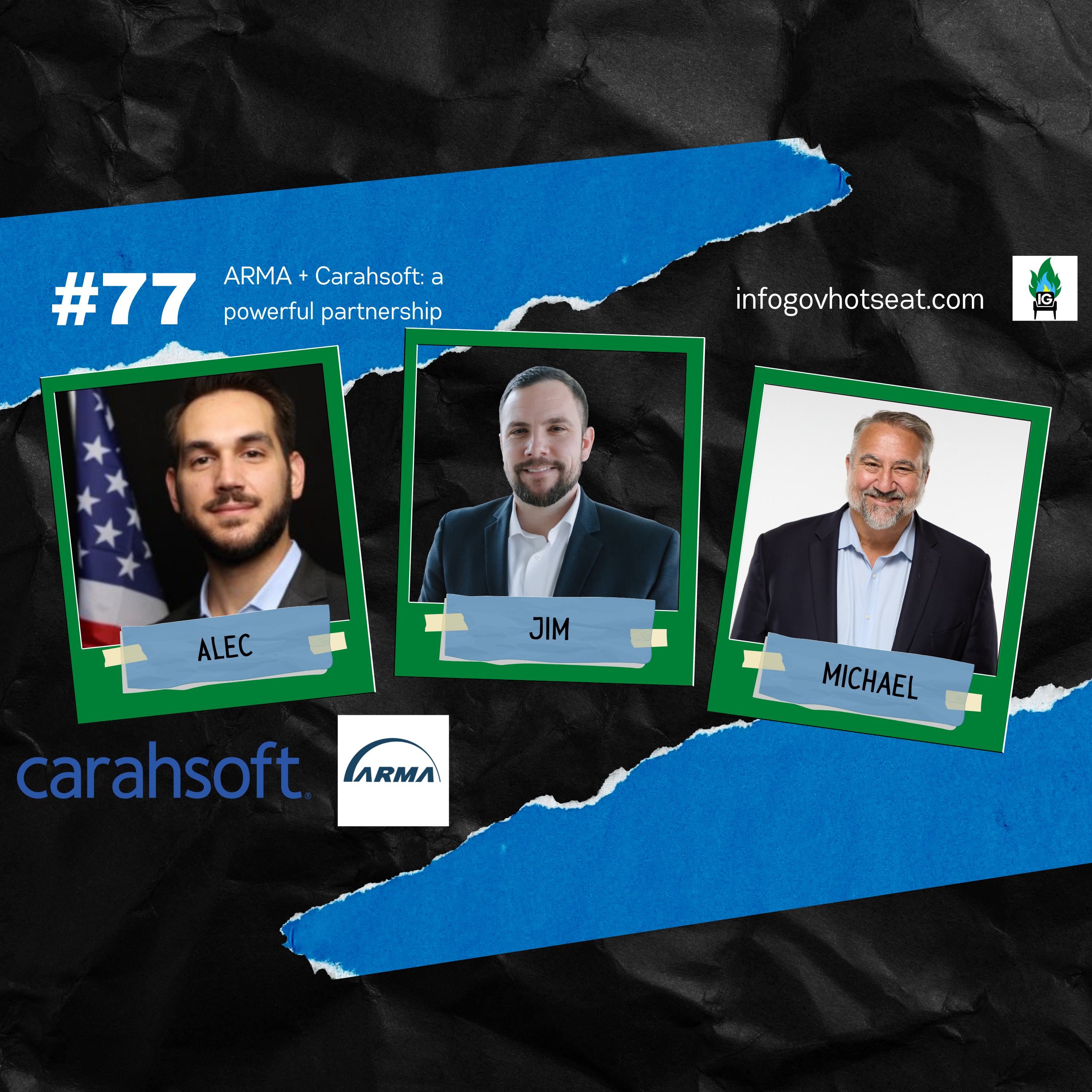IGHS63 - AI and the Future of Legal Tech: A Conversation with NetDocuments CEO Josh Baxter
In this conversation, Jim Merrifield interviews Josh Baxter, CEO of NetDocuments, discussing the evolution of legal technology, particularly the integration of AI into legal workflows. They explore the challenges and risks associated with AI, the importance of ethical considerations in AI development, and the future of knowledge management in law. The discussion emphasizes the need for seamless integration of technology in legal practices and the collaborative efforts required to navigate the evolving landscape of legal technology.
Jim Merrifield (00:00.85)
Well, hello and welcome to the InfoGov Hot Seat! I'm your host Jim Merrifield and with me today is Josh Baxter, CEO at NetDocuments. Welcome, Josh.
Josh Baxter (00:10.386)
Good morning, Jim. Thanks for having me.
Jim Merrifield (00:12.456)
Yeah, it's great to have you on the hot seat to talk about some legal technology here. I know it's early for you out West, but thanks for spending the time. I know I just said that you're the CEO of NetDocs, but why don't we allow you to introduce yourself, what your current role is, and also one fun fact about yourself.
Josh Baxter (00:31.016)
Yeah, yeah. Like Jim said, I'm the CEO here at NetDocuments, been the CEO of NetDocuments for just about eight years. It's been an amazing journey. And a fun fact about me is my first two jobs were the farthest thing from legal tech. I milked dairy cows, then I worked on a cattle ranch as a cowboy. So that's what I did in high school.
Jim Merrifield (00:52.889)
wow, so you're a cowboy. Wow, that's pretty awesome. So cowboy, legal tech.
Josh Baxter (00:58.106)
Yeah, it's an interesting combination. The founder of NetDocuments actually was also a cowboy, so it's like we're the two in legal tech.
Jim Merrifield (01:06.626)
wow, that's amazing. Awesome. Hey, so you got something I guess if the legal technology space doesn't work out for you, you can always go back to being a cowboy, right? Yeah, I won't mess with you, you know, because cowboys, not ones to mess around with.
Josh Baxter (01:13.806)
Fall back, okay.
Josh Baxter (01:22.12)
I got a couple of good horses still, so fortunately I got a play in that arena now.
Jim Merrifield (01:26.91)
Awesome, fair enough. Thanks Josh. So I know you've been, mentioned you've been CEO for the last several years. I know the business with the emergence of AI and other technologies, the business has kind of evolved over time. You care to talk about that a little bit?
Josh Baxter (01:42.94)
Yeah, so the story of NetDocuments is that a group of folks that actually had invented document management for the legal industry back in the late 80s and early 90s, they got together around 2000 and decided that they wanted to deliver document management through the browser. This was before the time that people talked about SaaS and cloud technology and things like that.
And they built a multi-tenant cloud platform from the beginning, like the very beginning. So when I showed up in 2017, what they had was a platform for storing, organizing, making findable all of a law firm's content. And we're talking about military-grade security and just a focus on information governance that became the
core of what the business is today. Now as it evolved, what we saw was an opportunity to bring more capabilities into the platform. So initially it was just managing all the documents and then it was managing the email associated with the matter. And then from there it was adding additional capabilities like being able to auto-generate documents or being able to create a deal bible at the end of a deal or being able to
to provide ethical walls and things like that, a bunch of additional security capabilities right inside the core platform. And that evolution continues because of the way that we store content, because of the way that our APIs work and make it easy for many vendors to integrate with us. We've really became the platform where a legal professional can do their work.
Right? They live inside net documents. And that gave us an incredible opportunity because of the way that we're architected, because of the way that we can natively bring in technology so easily. When we saw the move to artificial intelligence about two and a half years ago, within the legal sector, we were able to bring in OpenAI through Microsoft, a deep partnership with Microsoft.
Josh Baxter (04:06.672)
And be able to start to expose many different artificial intelligence capabilities that we believe will become the future of the way that legal professionals work. So, the fun thing about it is the core platform, which is what got me most excited when I first joined NetDocuments, wasn't built right. And we've been able to continue to keep it just like right at the cutting edge, have the very best.
technologies underneath it all the time. So that core platform is so extensible that we've been able to just continue to innovate and work ahead of the rest of the industry in ways that we bring new capabilities as legal professionals are prepared for them and are ready to adopt them.
Jim Merrifield (04:55.614)
That's amazing, very forward thinking for sure. Cause you were cloud first. I mean, you're still, you've always been cloud first, right? Browser based and you know, you just pop on a browser and you got your documents right on your desktop.
Josh Baxter (05:08.134)
Yeah, that's right. And over time, that's evolved to where it's not just, you in a browser, like that was the original beginning. But today, it really is the objective of meeting a legal professional where they work. If they want to work in Outlook, we're there. If they want to work in Word, we're there. If they want to work in a browser, we're there. And the real goal is to be as seamless as possible, where they're just doing their job and that documents is just...
a seamless part of the workflow that enables them to be more effective.
Jim Merrifield (05:41.362)
I love it and it makes sense that you're a tight partner with Microsoft because that's how Co-pilot is, right? It integrates, it's there. Wherever you're working, it's there. So very good.
Josh Baxter (05:49.584)
Yeah. Yeah, that's exactly right. We even think that over time, through an agent to agent experience, much of the experience for end users will be driven through copilot, where copilot is the entry point and then a request is handed off to net documents, where all of your information governance is in place, any ethical walls, any other security provisions are in place so that
only things that that end user is allowed access to are used to inform an answer, to generate a document, to progress the negotiation of an agreement, whatever it might be, all through a super seamless experience that is fueled by some sort of generative AI model.
Jim Merrifield (06:39.454)
It makes perfect sense. Now, of course, you mentioned AI before and along with AI and its amazing technology, there are some risks to utilizing AI and some challenges as well. Do you care to elaborate on that? What do you see as the biggest challenges around AI for legal professionals out there today?
Josh Baxter (06:59.752)
Yeah, so I want to touch on two things. And the first one I want to, I want to use a bit of analogy. So all of us are familiar with streaming services. We've got Hulu, we've got Netflix, and we've got Apple Plus and all these other things. And that experience, while it has allowed us to cut the cord, reduce our expenses, things like that, it's also become highly fragmented.
You know the experience of jumping into Apple TV and realizing, no, the show that I was watching is not here. I've got to go to Paramount Plus, got to go to Netflix. That disjointed experience is frustrating from a personal standpoint, but I live with it. But in a world of legal technology where the same sort of fragmentation is happening, which was, in my view, it's been necessary. That's how things advance really quickly.
you know, company A solves a very narrow problem, company B solves a very narrow problem, et cetera. But that allows the pace of innovation to be able to really accelerate. But in the medium term, that becomes really problematic for a couple of reasons. So the first is that if I'm an attorney and I have to jump into application A to...
for my assistant experience, to just have my chat GPT experience. And then when I'm done with that, then I jump into system B to do some semantic searching, and then I jump into system C to get access to some information that's been extracted from a document. At some point as an attorney, I'm just gonna say forget this, this is ridiculous. I need to have a very integrated experience where...
rather than taking my content to AI, I'm bringing AI to my content. And by that I mean, I want a platform that is where I work. I'm inside Microsoft Word, I'm inside Microsoft Outlook, I'm inside of my core system of content management, net documents. And in each of those experiences, I'm interacting with my content that is stored inside my document management system.
Josh Baxter (09:25.308)
And why is it so important that I interact with that content in one place? Well, first of all, I've just eliminated the disjointed experience that we get from the streaming services because now I'm getting all of that through one single kind of pane of glass, if you will. But then the second is I'm eliminating a substantial information governance problem. Every time that I take a piece of content out of my document management system and take it to a
point solution, if you will, kind of for AI, I've created a governance problem. So imagine a world where, you know, Jim has access to a particular matter, and he takes all that content, he puts it into a separate AI system, and does a bunch of work and creates a bunch of answers, and he's now got that in this other system. But then...
Now something happens and Jim no longer has access to that matters content. Well, in the example that I just shared, what happens is Jim still has access to all of the information in this other AI system, right? But if we've done it right and we brought AI to your content, when the privileges to access that particular matter are removed, now
Jim can't go back to the answers that he generated using that content. So any information governance capabilities you have in place are respected even later on. Whereas in the example when you're taking it out, it becomes this situation where your content is going to be spread across so many places that you can't possibly say to your clients, we know where your content's at.
We know it's safe and we can control access to it at any time because you've lost that control.
Jim Merrifield (11:22.91)
I agree with you. I mean, it's all over the place. You mentioned the app example or analogy resonates with me because every time every app you have to authenticate, you got to enter a password. I use the name of the password every single time, set up SSO, you know, so that's another whole, I guess, privacy data governance issue as well. So that's awesome. I love how you broke that down and gave me. Now I'll remember, I think, your answer because obviously who doesn't use like, you can cut your cable, but then you got to...
Josh Baxter (11:39.527)
Right.
Jim Merrifield (11:52.094)
you know, add like five or six apps.
Josh Baxter (11:54.184)
Yeah, yeah. The is, the vision is right, right? And all of the vision of each of the individual AI companies, I still believe is right. But over time, those capabilities all need to come into the core system of record so that you can create a great experience and have the governance that you need.
Jim Merrifield (12:14.642)
Yeah, because it's like how do I mean us governance folks are trying to figure out like how long do we actually keep the prompt? How do we keep? How long do we keep the result? Do we even have to keep the result? I think those are things that people are just wrestling with and there's really no clear. No clear answer.
Josh Baxter (12:31.506)
Yeah, particularly when you now have to have a new system vetted, you don't have the same level of compliance standards, you don't have the same level of trust as you do your DM. Like your DM is a system that you invested meaningful time investigating the security standards that they are held to, all the compliance standards that they meet, etc. So you truly trust it. And
then but now you start adding these others. You have to go through that same process. If you're moving content there, you have to go through the same process and have the same level of trust. Or you've got to get rid of the prompt immediately. You've got to immediately destroy the content. You've got to do all these other things.
Jim Merrifield (13:14.014)
Yeah, 100%. Now I know being a tech company, I'm sure you have a list of developers, you know, on staff, you're constantly innovating. And of course, you know, AI, we're not going to talk about all the risks, but there are risks. So how do you ensure that you're creating like, I guess, AI solutions that are ethically responsible? Is there any like blueprint that you follow?
Josh Baxter (13:37.148)
Yeah, so we do a few things. So the first is we are committed to all of capabilities that we build are going to be built inside our platform. And the reason for that is that that way the new capability is going to inherit all of the security standards we have in place. We continue to have
best-in-class military-grade security that defines the industry. And we're not willing to step away from those roots. That's kind of like first principles, if you will. The second is that anything that we are doing with AI, we're making sure is labeled so that the end user knows that this was generated with AI so that you're informing clients, you're informing attorneys. Because as we both know,
Ultimately, attorney and the law firm, they're going to be accountable for that, for their work product, whether they generated it themselves or they generated it with AI. The other thing that is important to us is that any artificially intelligence generated piece of content or a response to a prompt or anything like that in that document is informed by
the law firm's work product. We don't want it just being informed by the large language model. want it being, so the large language model is the foundation. But the other cornerstone to that is that it's informed by work products that you trust, that your organization has selected as your kind of key knowledge pieces, your gold standards, et cetera, so that
you can know and trust that the work that is being generated with whatever AI application is coming from your previous work product because you know your standards better than anybody else.
Jim Merrifield (15:47.55)
Yeah, no, I think that's exactly right. I mean, I think that's where a lot of firms and companies are struggling right now to take advantage of AI within the DMS or even within their content management solution, because do you clean up some of the data? Do you have to select the... It's kind of like a knowledge management problem. I talked to lot of firms and a lot of colleagues in my role and everybody's trying to figure out, where's the gold standard document that I can point this AI tool at?
Josh Baxter (16:13.862)
Yeah.
Jim Merrifield (16:16.822)
Having those conversations has kind of sparked a different conversation around, I think there's two ways, right, to take advantage of AI within the organization. You can point it to a whole document set and keep prompting it until you get your result. But this idea of personas has kind of started to come up. And what I mean by that is imagine you're a, I'd love to get your thoughts on this.
Imagine you're a first year, second year associate and you've been assigned a mentor, maybe a senior associate or I don't know, maybe a partner, right? Or maybe you're a partner and you've seen this second or third year associate that's really making strides. You see him as like he or she as your future, right? So you're trying to mentor, you're trying to introduce him to the client, he or she, the clients. Imagine if the AI could train on your persona as the partner.
at the law firm and then you could pass that knowledge or that LLM, that algorithm on to that associate or maybe a set of associates. I don't know if that's even possible. It's definitely been something that's been talked about, but it's a totally different concept. Love to get your thoughts on that.
Josh Baxter (17:25.298)
Yeah.
Josh Baxter (17:28.872)
Yeah.
Josh Baxter (17:33.864)
Yeah, it's an interesting idea because I think you're right that the knowledge management is a key problem that can be advanced or, you know, through AI. We very much have the mindset that, you know, having a separate purpose-built large language model today is not the right thing to do. We think that it'll evolve there, but it's not the right thing today.
The reason for that is that the models are advancing so fast that a purpose-built model will just be behind, and it won't possibly be able to keep up. Now, fast forward two or three or four years and the acceleration of the general models has slowed down. Then we think that having purpose-built micro models, if you will, or many models, if you will, is going to make sense. But in the meantime, you know,
Imagine a world where you can take all of your content. Some law firms will have a hundred million documents. Even a medium-sized AmLaw 200 is going to have 50 million documents. imagining you can take those documents, you can put all of them through a transformation engine that is extracting a profile of that document, if you will.
Jim Merrifield (18:44.221)
yeah.
Josh Baxter (18:57.51)
You know, today, profiling is this incredibly archaic approach where when we're saving a document or whatever it might be, you choose that it's an agreement and then you choose that it's a lease agreement and then you choose that it's a lease agreement based in New York and it's this manual process and what ends up happening is that each associate, each paralegal, they just have their own dumping ground and every document they work on has the same profile, which we know is inaccurate.
But imagine I can now feed it through a transformation engine and I can extract those things and I can have dynamic profiling based on the answer to the first two or three questions. And I can now take that. I can feed it into a data table. So now you've got this partner that wants to really educate this new associate. And what they can do is they can be able to say,
Now, go look over this core set of documents. And he doesn't have to say, or she doesn't have to say, these are the 12 documents. He can just say, go look over documents that have this set of attributes associated with them and use AI and summarize them, maybe even summarize all of them together into one summary that can start to inform this associate about the way that the partner thinks about things, the way that the partner
tends to model particular clauses or answers. And the pace of growth of that associate is going to be greatly accelerated. In addition to that, you're going to be able to use that same knowledge to drive automation inside the firm, to make sure that no deadline is ever missed again, because that profile captures.
those key dates. captures the termination clause. It captures whatever type of information is going to drive the future actions associated with an agreement or whatever it might be. And these ideas are just the beginning in my mind. As we're able to enrich that content in more meaningful ways, we're going to be able to accelerate the practice of law and frankly, open up the access.
Josh Baxter (21:23.048)
to law to a bunch of folks that don't have it today.
Jim Merrifield (21:26.524)
Yeah, you got my mind. I'm spinning right now. You know, I think we could. That's great. I'm sure we could have a longer conversation about this. I'm sure we'll have a part two. But Josh, I know we talked about a lot here. Is there anything that you want to leave the audience with anything that we didn't talk about?
Josh Baxter (21:29.832)
Awesome. That's I hope for.
Josh Baxter (21:45.928)
Yeah, I think that if you look at the journey that the industry has been on, at least during my eight years, and I think that I can comfortably say, I think I can comfortably say, never has the legal industry been the tip of the spear in adopting a new technology. But now they are. We're leading the charge in ways that we've never done before.
the first two years, 2023 was kind of like, okay, the hype was building, everybody's talking about it, a whole bunch of decisions were being made out of FOMO. And then we realized, wait a minute, nobody knows exactly how they're gonna deploy this, nobody knows exactly what problems we're gonna solve. So everybody was kind of dabbling. And the shine kind of came off, if you will.
What we expect in 25 and 26 is now the vendors have worked with our customers and we've really figured out what are the things that should be built into the application, what are going to be easy to deploy, what are some places we can dip our toe in, what are some places that we can get kind of waist deep in it without going kind of head first.
And what I expect is in 25, a lot of those technologies that get law firms and corporate legal departments waist deep are going to be deployed and be used by end users. And as you advance to 26 and 27, you're going to see that every law firm, every corporate legal department is using these technologies in meaningful ways. And they're going to be looking to do it inside platforms that they already own. They can't vet a dozen different
places they're going to look for. Like these are the three or four or five key capabilities. And I'm going to look for those capabilities to be in the systems, the platforms that I already own. Some of those will be like their business apply application, right? Whether it's, you if they're a small firm and you know, that they're using kind of the all in one practice management solution. If they're a big firm like you, you know, you're using the Aderants or the Elites etc. of the world. And you're going to look to those vendors.
Josh Baxter (24:09.02)
Just like you're gonna look to your document management vendor to solve the core four or five so that you can get them put in place, get them adopted and generate real value, not just for your firm or for your clients. And we think that that's gonna happen in the next two years.
Jim Merrifield (24:24.092)
Excellent, it's gonna be an exciting ride. And I love what you said about, you know, working with your customers, because I think the more that we as law firms can work with our business partners like yourself, and then even by extension work with our clients, it's almost like a three, a three way conversation that needs to happen, because we're all kind of facing the same issues. And I definitely can.
Josh Baxter (24:29.64)
Thank
Josh Baxter (24:42.248)
That's right.
Jim Merrifield (24:47.172)
echo with your saying, I see that there's way more conversations happening now around AI. And I thought like 15 years ago when security, everybody was worried about like information security and the data breach and all that stuff. And we didn't really necessarily have these conversations ahead of that. We kind of just had to have them, you know, as we continue to evolve and move on. But I see much more firms and clients and business partners having those conversations now around AI. And I think that's just going to
Josh Baxter (25:02.79)
Yeah.
Jim Merrifield (25:16.35)
position us really well, know, into the future. So that's awesome. listen, Josh, thanks so much for spending some time here in the hot seat. You know, get to know you a little better, your company, what you got, you know, cooking in the, in on the docket for the year and also your insights. Thank you so much for sharing that with with our audience today.
Josh Baxter (25:18.022)
Yeah, I completely agree.
Josh Baxter (25:38.054)
Of course, thanks for having me. Really enjoyed it.
Jim Merrifield (25:40.402)
Yeah, absolutely. And if you'd like to, for our audience, you'd like to be a guest on the InfoGov Hot Seat like Josh here, all you have to do is submit your information through our website, infogovhotseat.com. And thank you so much. Enjoy the rest of your day.

CEO, NetDocuments
Josh Baxter is the CEO of NetDocuments, the world’s leading cloud-native, intelligent document management and productivity platform for legal professionals. With over 25 years of global technology leadership experience across Sales, Engineering, and Operations, Josh is dedicated to driving innovation, operational excellence, and customer-centric strategies. He is passionate about building high-performing teams and cultivating peak-performance organizations that consistently deliver extraordinary results.
NetDocuments empowers over 7,000 law firms, corporate legal departments, and public sector organizations worldwide to streamline document and email management with award-winning features, including advanced automation, AI capabilities, robust security, and seamless integrations with Microsoft 365. Recognized as one of America’s fastest-growing private companies, NetDocuments has been featured on the Inc. 5000 list for three consecutive years. Its intelligent platform enables legal professionals to enhance efficiency, boost productivity, and achieve greater accuracy—harnessing the power of AI within a secure and safeguarded framework where they do their best work.









